Did fox hunting disappear?
- Published
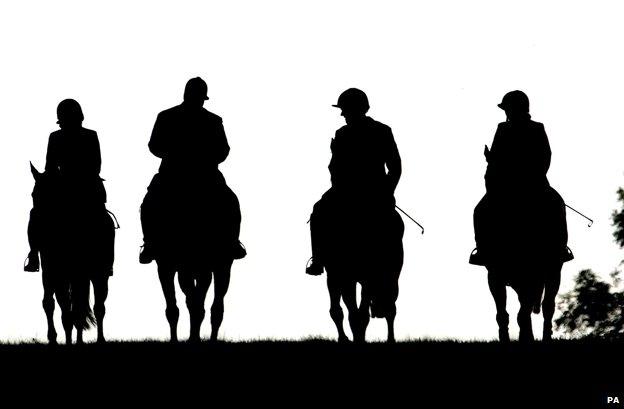
It's 10 years since the ban on hunting foxes in England and Wales came into force, amid mass protests by those in favour and against. What is the situation like now?
The countryside is a superficially calmer place than it once was. For more than a few years before Parliament passed the Hunting Act in late 2004, violent exchanges between enthusiasts and opponents were widely reported. Saboteurs tried to disrupt hunts, external, arguing the sport was unnecessarily cruel. Trouble sometimes occurred.
In 1998, around 250,000 people marched at Westminster to protest against the perceived threat to rural life of an earlier, failed bill. They said there was no evidence animals suffered more than under other forms of pest control and that the Labour government was waging class war.
The Labour government used the Parliament Act, external to ensure opposition in the House of Lords would not scupper the 2004 Hunting Bill, backed in a free vote of the House of Commons. About 3,000 protesters gathered, external outside when MPs voted, some becoming involved in scuffles with police and one group burning an effigy of Tony Blair in Parliament Square.
After the Hunting Bill passed, supporters claimed it would protect animals, while opponents decried it as bad law which would be impossible to implement.
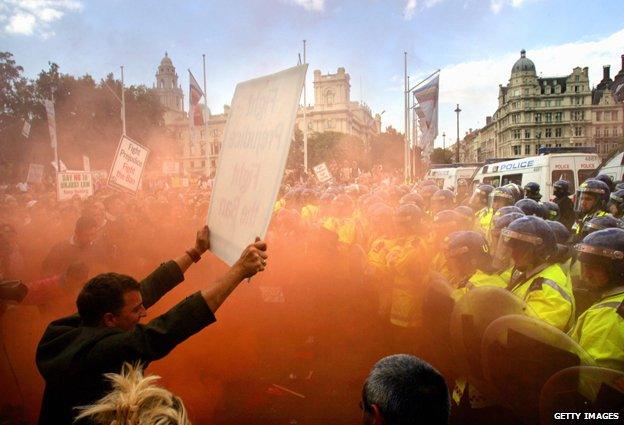
Police and protesters clash outside Parliament during the passing of the 2004 Hunting Bill
Ten years after the Hunting Act came into force in February 2005, hunts continue to meet, most notably and with most ceremony on the sport's big occasions, such as Boxing Day, external. Members continue to wear a variety of traditional outfits, external, including, in many cases, the famous red jackets reserved for men who have won the hunt's "colour" or by men and women designated "master or huntsman". Non-members attempt to follow progress on foot or by vehicle.
The number of hunt members has increased to about 45,000, according to the Countryside Alliance, which views the ban on killing foxes with dogs as temporary. The numbers turning out to support or take part in major events, such as Boxing Day, is thought to be in the hundreds of thousands. There are 186 packs, external recognised by the Master of Foxhounds Association across Britain.
"There's an enormous sense of community around the fox hunt," says Garry Marvin, professor of human-animal studies at the University of Roehampton. "There's an enormous social life with it, which is really important for many in rural areas."
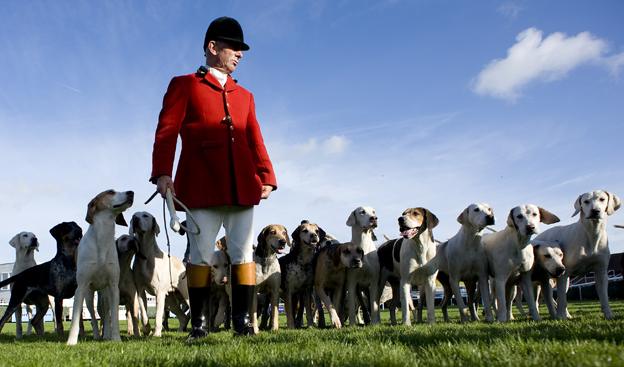
Hounds from the Vine & Craven Hunt are paraded at Newbury racecourse in 2011
Gerald Sumner, master of the Kimblewick Hunt, external, which covers a large area of Bedfordshire, Berkshire, Buckinghamshire, Hampshire, Hertfordshire and Oxfordshire, says protesters sometimes still turn up in balaclavas.
"They'd almost disappeared," he says, "but more people seemed to get involved when the government started culling badgers in parts of England in 2013. That seemed to reinvigorate the protesters. Still, it's not like the late 1980s and early 1990s, which were much more militant times."
Under the Hunting Act, foxes can no longer be killed by dogs as part of a hunt. One or two dogs can be used to "flush out" - remove from cover - a fox, which should then be shot. A full pack of dogs can be used to flush out a fox to be hunted by a bird of prey.
If flushing out goes wrong and a dog ends up killing a fox, external, any prosecution under the act must prove that the humans in charge intended this, rather than shooting or killing by the bird, to happen.
Opponents of hunting say animals are still being killed and the Hunting Act needs strengthening, with prison sentences as long as six months being added to the financial penalties of £5,000 already in place.

The law in England and Wales governing hunting with dogs
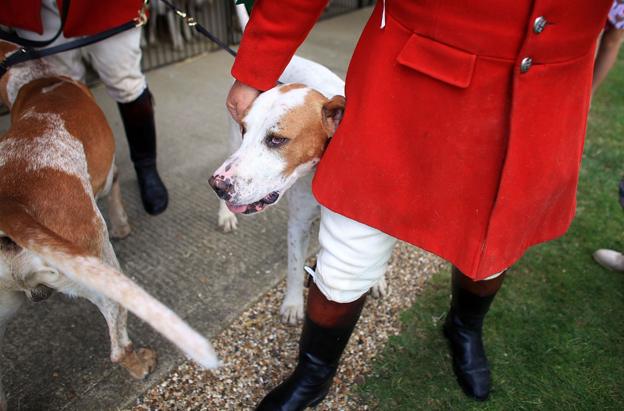
You can't use dogs to hunt foxes, hares or deer
You can use dogs for:
stalking and flushing out - but only to control pests, eg hares, and only if they're shot as soon as possible afterwards
Hunting rats and rabbits
Retrieving hares that have been shot
drag hunting and trail hunting

"It's a very successful and popular piece of legislation," Michael Stephenson, campaigns director of the League Against Cruel Sports, says. "The problem is with people who break the law. There are plenty of ways in which the pro-hunt groups have used tricks to get below the legislation. What they are doing is contradicting the spirit and intent of the law."
Hunts say they comply fully with the law but want the act repealed and are lobbying MPs, particularly Conservatives in rural constituencies, hard ahead of May's general election.
Some foxes have been killed by dogs. The Kimblewick Hunt has reported incidents to the police. Such deaths are "inevitable", says Sumner, adding: "That's where the law is a complete ass." It is impossible to prevent all physical encounters between dogs and foxes, he argues. "That's what the dogs are bred to do," adds Sumner. "Dogs will be dogs, as the term goes."
The ban on fox hunting does not affect drag hunting, external, which started in the early 19th Century. It involves humans laying a scent - such as aniseed or a chemical mixed with oil and water - for hounds to chase, rather than following an animal.
Trail hunting, external, on the other hand, did not exist until the ban. It involves laying a fox's scent, usually its urine, for the dogs to follow. Hunt supporters say trail hunting means hounds, which are not trained by humans to hunt but pick it up from senior members of the pack, will not have forgotten to chase foxes if and when the ban is lifted.
The League Against Cruel Sports argues that this allows old-style hunting with dogs by default. "What they are doing is trailing fox urine near where foxes are likely to be," says Stephenson. This means more foxes are being attacked and dying as a result of coming into close contact with hounds following the scent, he says.
The Countryside Alliance vehemently denies this accusation. More than 300 prosecutions, external have been brought under the act, but the Countryside Alliance says most of these were for poaching and other offences not related to official hunts.
"The quality of legislation should not simply be judged by inaccurate perceptions about the number of prosecutions under it," says the RSPCA, which has brought cases to court.
The Countryside Alliance contends that the "spirit and intent" of the Hunting Act were wrong and it was not based on any scientific evidence that hunting with dogs caused foxes more suffering than other forms of pest control.
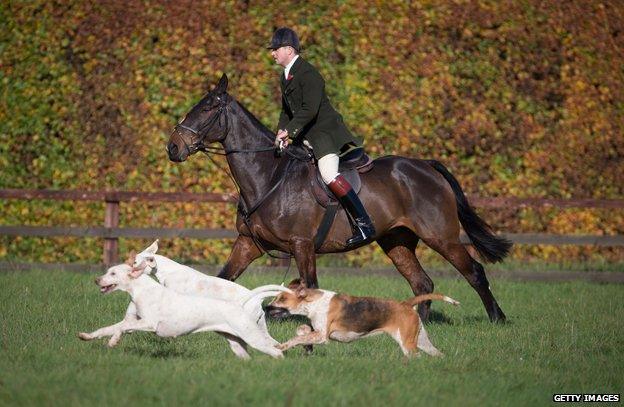
Hunts are reliant on supportive farmers to allow them to use their land. The Countryside Alliance says most have been helpful.
The main work now carried out by the League Against Cruel Sports is the monitoring of hunts with video cameras, to ensure the act is complied with.
"We don't have any problem with monitoring," says Sumner. "But really it's not their job. If someone is looking for criminal activity, that should be the police, not vigilantes. It's like me waiting outside someone's house in case they are parked on double yellow lines."
But, argues the Hunt Saboteurs Association, external, "now the fuss and media attention has died down, most hunts are carrying on as they did before. The police have never known much about hunting other than how to try to protect it, so we never had much faith in them changing sides".
"I think people are pleasantly surprised how things have been in the last 10 years, but it hasn't been without difficulty," says Tim Bonner. the Countryside Alliance's head of campaigns. "The law is a complete dog's dinner, but people who hunt are extraordinary. They probably thought people were going to give up and play golf or watch football. That was never going to be the case."
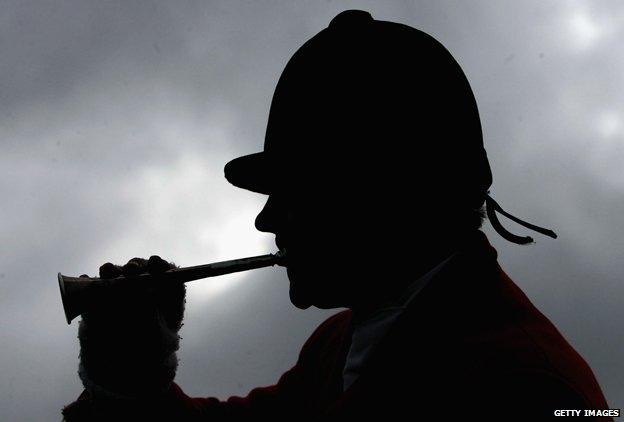
The two sides argue over the degree of distress a fox feels when chased. Opponents say it is cruel and that hunting is totally unnecessary for pest control. Supporters say the animal is incapable of anticipating its fate until almost the moment of capture and that the death is almost as speedy as when shot.
An opinion poll commissioned by the League Against Cruel Sports, external and carried out by Ipsos MORI in November 2013 suggested that 80% of people thought fox hunting should not become legal again. Some 17% of almost 2,000 people questioned responded that it should. Support for keeping the ban was the same in rural and urban areas, it suggested.
The Countryside Alliance disputes these figures, arguing that most people are apathetic about foxhunting.
Fox hunting with dogs is banned in Scotland, as in England and Wales, but more than two dogs can be used to flush out foxes to be shot. It remains legal in Northern Ireland.
The Conservative manifesto at the last general election said the Hunting Act was "unworkable" and promised a free vote by MPs on its repeal. The party says it remains committed to this happening if it wins a parliamentary majority in May. In that event, a truly contentious debate will be reopened.

More from the Magazine
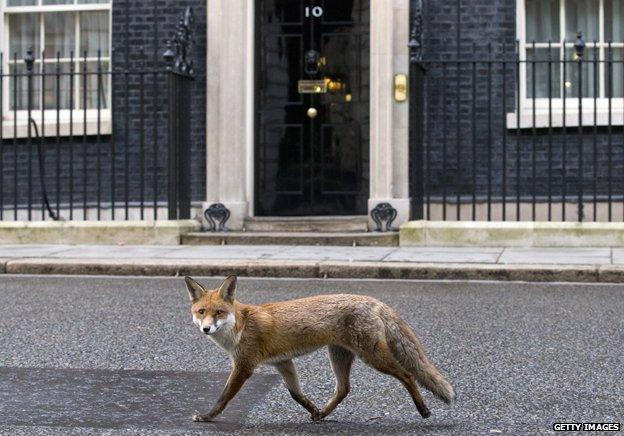
There are an estimated 33,000 urban foxes in the UK's towns and cities. Outwitting the wily creatures is becoming an increasingly popular way to control them humanely.

Subscribe to the BBC News Magazine's email newsletter to get articles sent to your inbox.